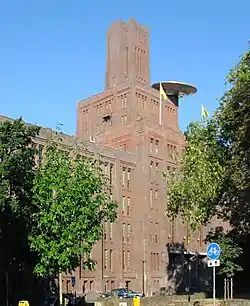ProRail
In the Netherlands, ProRail (Dutch pronunciation: [proːˈreːl]) is a government task organisation that takes care of maintenance and extensions of the national railway network infrastructure (not the metro or tram), of allocating rail capacity, and of traffic control. Prorail is a part of NS Railinfratrust, the Dutch railway infrastructure owner. It consists of the following infrastructure management organisations:
- Railinfrabeheer (Rail Infrastructure Management, RIB)
- Railned (railway capacity allocation - long-term planning, more than 52 hours before the day of the train service)
- Railverkeersleiding (traffic control - short-term planning, less than 52 hours before the day of the train service)
| Type | Government agency |
|---|---|
| Industry | Rail Transport |
| Founded | 2003 |
| Headquarters | , |
| Products | Rail Infrastructure Management, Railway Capacity Allocation, Traffic Control |
| Revenue | |
| € 0 (2017) | |
Number of employees | 4,399 (2017) |
| Website | http://www.prorail.nl |

The rail capacity supplied by ProRail is used by several public transport operators:
- Nederlandse Spoorwegen (NS), the passenger train operating company on main lines,
- Smaller passenger operators, including Qbuzz, Arriva, Keolis Nederland, and Connexxion/Breng,
- DB Regionalbahn Westfalen, which mainly operates in Germany
- Cargo operatorsm including DB Cargo, Rotterdam Rail Feeding, and Lineas.
- Smaller freight operators, including: Rail4Chem (now owned by Veolia), Veolia Cargo, ERS Railways, Bentheimer Eisenbahn, HGK, Portfeeders (part of ACTS), and SNCF Fret
Its Utrecht headquarters is in the former offices of Nederlandse Spoorwegen (known as De Inktpot, "The Inkwell"), the largest brick building in the Netherlands. The building currently features a "UFO" on its facade resulting from an art program in 2000.
Funding
Funding for ProRail is provided by a government subsidy, and a fee paid by the railway operators (called infraheffing). The government subsidy totalled around €2.5 billion from 2014–2017,[1] and the infraheffing totalled approx. €200 million in 2006, the remaining income was listed as 'other'. The fee that the public transport operators have to pay for this is lower than the cost, but increasing. In 2003 it was €0.64 per train km and €0.54 to €2.16 for stopping at a station.
Performance oriented maintenance
Railways in the Netherlands are not maintained by ProRail itself. Instead, it is subcontracted to recognised maintenance contractors. The Dutch railway network is subdivided into 21 areas.[2] For each area, all of the regular maintenance is contracted as one package, which is won by the contractor that submits the best offer. The contractor receives a fixed sum per month, and is fined in case of failure to meet the required performance. Contractors are incentivised to minimise cost, while ensuring good performance of the assets. This is called prestatiegericht onderhoud (performance oriented maintenance).[3]
As of 2019, the recognised maintenance contractors are:
- ASSET Rail (a joint venture by Arcadis and Dura Vermeer)
- BAM Infra Rail
- Strukton Rail
- VolkerRail
See also
References
- "ProRail report 2015" (PDF). p. 30. Archived from the original (PDF) on 2016-03-03. Retrieved 2016-02-22.
- https://maps.prorail.nl/portal/sharing/rest/content/items/1fbce2d13ee2468582ea76a2606fdae3/data
- "ProRail - Spooronderhoud / PGO".
External links
- Nederlandse Spoorwegen
- Network statement 2003 (pdf-file, 646 kB)
- ProRail